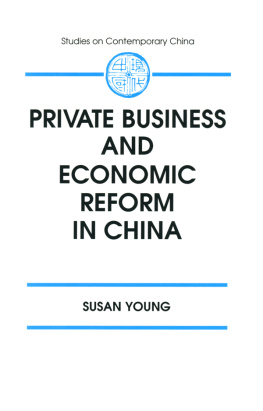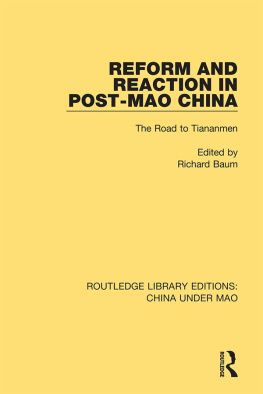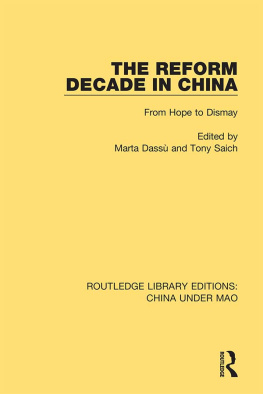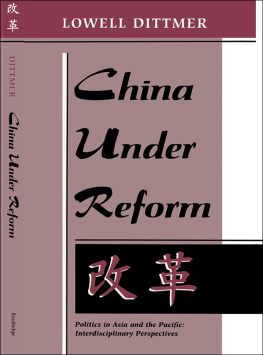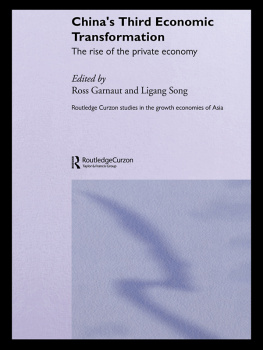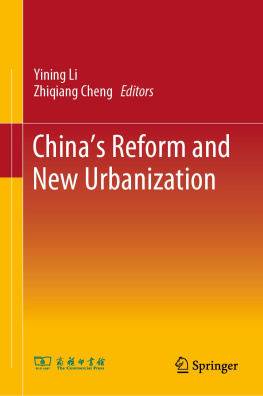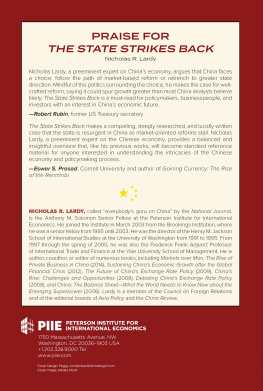PRIVATE BUSINESS AND ECONOMIC REFORM IN CHINA
The revival of the individual economy in China in the late 1970s was justified on the grounds that it was economically appropriate and that it would be easily constrained by government regulation and by its dependence on socialist economy. Through the 1980s, however, reforms which decentralized economic power and increased the role of the profit motive dramatically weakened these limits. When state regulations conflicted with economic incentives, local officials often found informal solutions to the problem. While the private sector remained dependent on personal goodwill and informal relationships, it also developed rapidly and became a significant feature of the economy; one that was largely under local rather than central control. Thus the reforms have given rise to new interest networks, with which the private sector is intimately involved, and which are now fighting to preserve the benefits they have obtained from the reforms and to bend central policies to their own ends.
Based on Party and state documents, Chinese newspaper reports and surveys, the Chinese and Western scholarly literature and the authors own fieldwork, this important study examines the private sector as a case study of the mechanics of reform in China, emphasizing the relationships among local officials, private businesses, and central policy. The book traces the growth of private business in China since 1978 and focuses on the interaction between private sector policy and other reforms and examines how this has affected Chinas political economy.
Studies on Contemporary China
THE POLITICAL ECONOMY OF CHINAS SPECIAL ECONOMIC ZONES
George T. Crane
WORLDS APART
RECENT CHINESE WRITING AND ITS AUDIENCES
Howard Goldblatt, editor
CHINESE URBAN REFORM
WHAT MODEL NOW?
R. Yin-Wang Kwok, William L Parish, and Anthony Gar-on Yeh with Xu Xuequang, editors
REBELLION AND FACTIONALISM IN A CHINESE PROVINCE
ZHEJIANG, 19661976
Keith Forster
POLITICS AT MAOS COURT
GAO GANG AND PARTY FACTIONALISM IN THE EARLY 1950s
Fredrick C. Teiwes
MOLDING THE MEDIUM
THE CHINESE COMMUNIST PARTY AND THE LIBERATION DAILY
Patricia Stranahan
THE MAKING OF A SINO-MARXIST WORLD VIEW
PERCEPTIONS AND INTERPRETATIONS OF WORLD HISTORY IN THE PEOPLES REPUBLIC OF CHINA
Dorothea A.L. Martin
POLITICS OF DISILLUSIONMENT
THE CHINESE COMMUNIST PARTY UNDER DENG XIAOPING, 19781989
Hsi-shengChi
CONQUERING RESOURCES
THE GROWTH AND DECLINE OF THE PLAS SCIENCE AND TECHNOLOGY COMMISSION FOR NATIONAL DEFENSE
Benjamin C. Ostrov
THE PARADOX OF POWER IN A PEOPLES REPUBLIC OF CHINA MIDDLE SCHOOL
Martin Schoenhals
CHINAS ECONOMIC DILEMMAS IN THE 1990s
THE PROBLEMS OF REFORMS, MODERNIZATION, AND INDEPENDENCE
Edted by the Joint Economic Committee, Congress of the United States
CHINA IN THE ERA OF DENG XIAOPING
A DECADE OF REFORM
Michael Ying-mao Kau and Susan H. Marsh, editors
DOMESTIC LAW REFORMS IN POST-MAO CHINA
Pittman B. Potter, editor
POLITICS AND PURGES IN CHINA
RECTIFICATION AND THE DECLINE OF PARTY NORMS, 19501965
Frederick C. Teiwes
MORNING SUN
INTERVIEWS WITH POST-MAO CHINESE WRITERS
Laifong Leung
CHINESE FIRMS AND THE STATE IN TRANSITION
PROPERTY RIGHTS AND AGENCY PROBLEMS IN THE REFORM ERA
Keun Lee
THE MARKET MECHANISM AND ECONOMIC REFORMS IN CHINA
William A. Byrd
CHINA, THE UNITED STATES, AND THE SOVIET UNION
TRIPOLARITY AND POLICY-MAKING IN THE COLD WAR
Roberts. Ross, editor
AMERICAN STUDIES OF CONTEMPORARY CHINA
David Shambaugh, editor
CHINAS AUTOMOBILE INDUSTRY
POLICIES, PROBLEMS, AND PROSPECTS
Eric Harwit
DECISION-MAKING IN DENGS CHINA
PERSPECTIVES FROM INSIDERS
Carol Lee Hamrin and Suisheng Zhao, editors
PRIVATE BUSINESS AND ECONOMIC REFORM IN CHINA
Susan Young
An East Gate Book
First published 1995 by M.E. Sharpe
Published 2015 by Routledge
2 Park Square, Milton Park, Abingdon, Oxon OX 14 4RN
711 Third Avenue, New York, NY 10017, USA
Routledge is an imprint of the Taylor & Francis Group, an informa business
Copyright 1995 Taylor & Francis. All rights reserved.
No part of this book may be reprinted or reproduced or utilised in any form or by any electronic, mechanical, or other means, now known or hereafter invented, including photocopying and recording, or in any information storage or retrieval system, without permission in writing from the publishers.
Permission has been granted for passages appearing in this book from the following sources:
Susan Young, Wealth but Not Security: Attitudes toward Private Business in the 1980s, in Andrew Watson, ed., Economic Reform and Social Change in China, pp. 6387. London: Routledge, 1992.
Susan Young, Policy, Practice, and the Private Sector in China. The Australian Journal of Chinese Affairs, no. 21, January 1989, pp. 5780.
Susan Young, Wealth but Not Security: Attitudes toward Private Business in the 1980s, The Australian Journal of Chinese Affairs, no. 25, January 1991, pp. 115139.
The first two sections of chapter 6, and the beginning of the section in chapter 7 on The New Approach to Central Control: 1989 and After, draw extensively on Susan Young, Private Entrepreneurs and Evolutionary Change in China, in David S. G. Goodman and Beverley Hooper, eds., Chinas Quiet Revolution: New Institutions Between State and Society. Melbourne: Longman Cheshire, 1994, pp. 105125. Permission of the publishers gratefully acknowledged.
Library of Congress Catatoging-in-Publkation Data
Young, Susan, 1964
Private business and economic reform in China / Susan Young.
p. cm.(Studies on contemporary China)
An east gate book.
Originally presented as the authors thesis (Ph.D.University of Adelaide), 1991.
Includes bibliographical references and index.
ISBN 1-56324-500-0.ISBN 1-56324-501-9 (pbk.)
1. PrivatizationChina. 2. Free enterpriseChina. 3. Industrial policyChina.
4. ChinaEconomic policy1976- .1. Title. II. Series.
HD4318.Y68 1995
338.951dc20
94-32541
CIP
ISBN 13: 9781563245015 (pbk)
ISBN 13: 9781563245008 (hbk)
Contents
The bulk of the research for this book was done in preparation for a Ph.D. dissertation, submitted to the University of Adelaide in 1991. Fieldwork was funded by the University of Adelaide, the AustraliaChina Council, and the Federation of University WomenSouth Australia Inc. Further research was undertaken while I was teaching at the Centre for Asian Studies, University of Adelaide, with funding from the University and the Australian Academies of Social Sciences and HumanitiesChinese Academy of Social Sciences exchange program. I am grateful to these organizations for their support and to the Centre for Asian Studies for providing me with a pleasant and stimulating working environment.
While at Adelaide I was very fortunate to have been a student and colleague of Andrew Watsons, and much of what is good in this book is due to his help. I also gained a lot from discussions with colleagues in the Chinese Economy Research Unit, particularly Christopher Findlay and Li Qingzeng. Jonathan Unger and the anonymous readers of two papers I submitted to the


